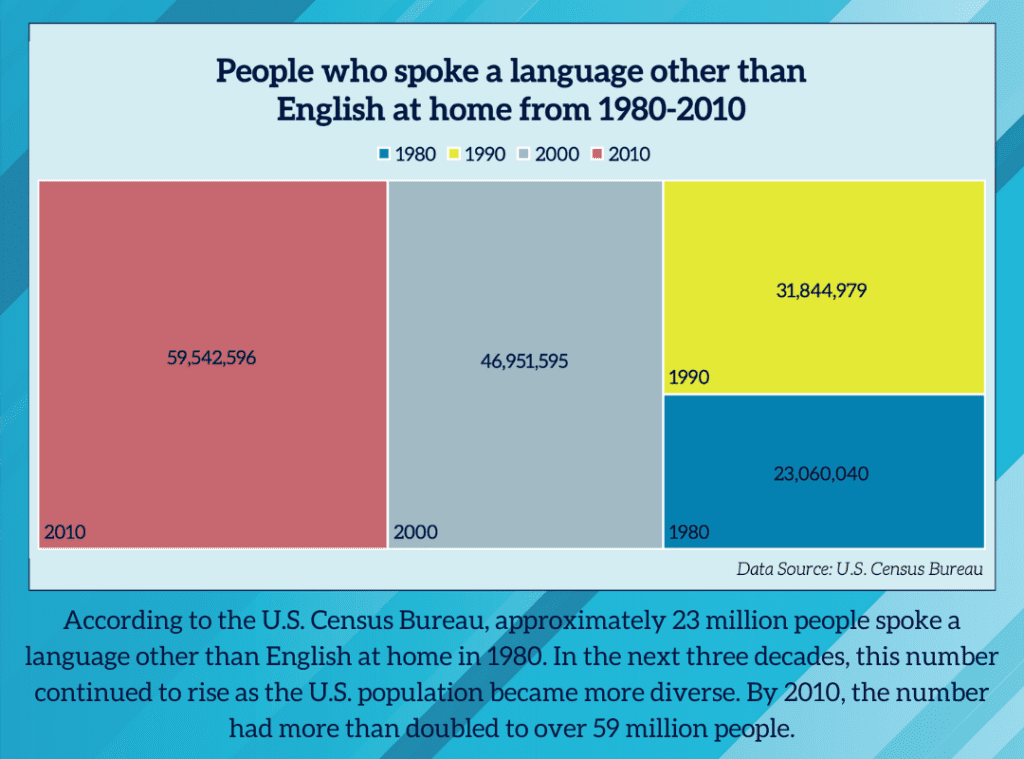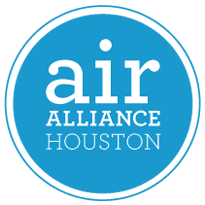Language justice is a framework that focuses on allowing people to have their ideas and stories heard and their rights be unimpeded no matter which language they primarily use. Though English is the most widely spoken language in the country and is used in government documents, court procedures, and business contracts, the U.S. does not officially declare or have a national language. The U.S. population consists of people from many diverse cultures, and it is important that their quality of life is ensured and remains unaffected by the language they are most comfortable using.

Communication can take on a variety of forms including but not limited to sign language, synthetic speech, Braille, and audio texts. Regardless of an individual’s method of communication, their rights should be guaranteed and respected.
For people who communicate in non-dominant languages, such as Spanish or American Sign Language, they may find themselves in adverse situations that negatively affect them and their livelihoods since not enough accomodations are made for language differences among the population. By deliberately preventing a person from fully comprehending a situation and lodging complaints about it, the individual’s ability to exercise autonomy has been taken away. The individual would not be made aware of the options or services that are available to all others — to no fault of their own. While languages may offer transparent communication, they may also be used as a method of oppression.
Language justice is inextricably tied to Environmental Justice and vice-versa. Without language justice, individuals may find themselves facing environmental hazards and living in unsafe neighborhoods. Environmental justice is a framework that focuses on the fundamental right to access clean and safe water, air, and food. Without these, communities across the country and around the world are barred from accessing important resources. Many communities become disposal sites to facilities that produce toxic wastes and byproducts, which can be detrimental to the health of residents. The framework recognizes the disproportionate effect environmental injustice has on low-income communities of color and pushes for the unobstructed ability of community members to participate in processes with outcomes that may potentially affect their health and livelihoods.
An example of how language justice may affect a person’s rights to a healthy and safe living environment can be seen in the Manchester community located in Houston. The neighborhood is mostly comprised of Latino residents with many considered to have Limited English Proficiency (LEP). Based on the then relevant monitoring guidelines established by the Obama administration, the Valero refinery in Manchester must track and possess a permit in order to emit hydrogen cyanide – a neurotoxin that can lead to death depending on its concentration in the air after a few minutes of exposure. The Valero refinery had requested permission to emit more than 512 tons of hydrogen cyanide annually. Though a public forum was held by the Texas Commission on Environmental Quality (TCEQ) to allow residents to make public comments regarding the refinery and learn more about the toxic gas, a lack of language accommodations prevented residents from participating at full capacity. Signs with information about the meeting were written in English, and insufficient translation services were provided for residents who attended.
The environmental injustice witnessed in Manchester was hardly an isolated incident. Therefore, a civil rights complaint about the TCEQ’s discrimination against Spanish speakers was filed, leading to an investigation conducted by the U.S. Environmental Protection Agency (EPA). Since then, the TCEQ has made a statement to commit to the accessibility for LEP individuals.The agency released its Language Access Plan in 2021 in accordance with Title VI of the Civil Rights Act and Executive Order 13985.
Although the plan is a good step forward to increase accessibility to community members, it leaves much to be desired. The Language Access Plan currently states that the TCEQ will translate documents that are classified as “vital,” such as documents regarding the agency’s programs, activities, and services depending “upon the importance of the program, information, encounter, or service involved, and the consequence to the LEP individual if the information in question is not provided accurately or in a timely manner.” However, documents that give context to those programs and services are equally important and should also be translated, such as public meetings notices, hearing agendas, violation notices, disciplinary action announcement, summaries of permits, and so forth. By being fully aware of an entity’s violation records, for instance, residents can be more knowledgeable about the safety and health of their community.
The TCEQ has been open to public comment through public virtual meetings to explain, revise, and edit their proposed plan. The agency will be holding its next online stakeholder meeting to solicit feedback on August 02, 2022 at 7:00 PM CST using Zoom. In addition to the Language Access Plan, TCEQ will hear input on their Disability Non-Discrimination Plan and Public Participation Plan at this meeting. By tackling the current language barriers, residents can better advocate for themselves and the communities they live in.
The Language Access Plan is ridden with many other shortcomings. For one, it does not require language assistance services to be available or special training for interpreters and translators to ensure language translation competency. The Language Access Plan should also include the agency’s responsibility in assessing the local demographics of communities that will be impacted by TCEQ decisions. State level LEP data, included in the plan, are insufficient to meet the language needs of local communities. Lastly, TCEQ needs to be proactive in creating transparency to allow for more public engagement.
